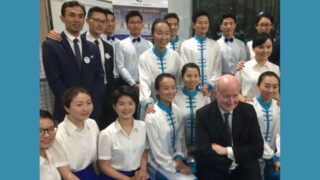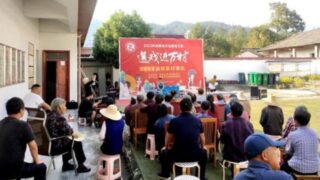Not coincidentally, border tensions with India are accompanied by a renewed campaign against Indian religious and spiritual movements active in China.
by Massimo Introvigne


“If you see a man wearing a maroon waistcloth and bead necklace sitting next to a yoga mat in a secluded meditation room in China, chances are he may not be a graced spiritual leader. China has become a hotspot for Indian-born disgraced ‘gurus” and cult organizations scamming people by selling them so-called spiritual lessons.” This is how the CCP propaganda mouthpiece Global Times introduced an article on Indian “cults” operating in China published on June 15. The same day, the Global Times published two other articles against Indian so-called “cults,” one reminding readers of Chinese laws against xie jiao, and the others featuring comments by “experts” of China Anti-xie-jiao Association. The three simultaneously published articles by the Global Times refer to parallel articles in Chinese-language media.
Among the targeted groups are followers of Osho Rajneesh (1931–1990). It is alleged that, “part of Rajneesh’s sexual theories made their way to China, where they were welcomed by those who engaged in illegal activities such as group prostitution.” In fact, Chinese authorities already cracked down on Osho devotees in 2010 in Fujian and in 2012 in Guangdong.
The main concern of CCP anti-cultists seem now to be the Oneness University and O&O Academy, operated by the Oneness Movement, headquartered in Varadaiahpalem, Andhra Pradesh, India, and not to be confused with the unrelated Oneness Center based in New York. The Oneness Movement was founded in 1984 by Vijay Kumar, known as Sri Bhagavan, and his wife Srimati Padmavati, known as Sri Amma. Bhagavan and Amma are regarded by their followers as two halves of the same being, known as Sri Amma Bhagavan. Confronted with health issues and demanding controversies with Indian tax authorities, Sri Bhagavan handed over in 2019 most of the Oneness Movement organizations to his son Krishnaji (N.K.V. Krishna) and to Krishnaji’s wife, Preetha Ji.


The spirituality of the Oneness Movement is introduced as non-sectarian and ecumenical. Scholars regard it as a combination of traditional Hindu and New Age elements. It has been comparatively successful in China, and has operated a Oneness University in Beijing for several years. The Oneness Movement is now the most visible Indian spiritual movement in China. CCP-related sources claim that “a team composed of more than a dozen team organizers [and] some 200 lecturers and volunteers” is at work to recruit Chinese to seminars held both in China and India. Reportedly, more than 10,000 went to India for Oneness spiritual training. In Beijing, training is offered four times each month (now online only due to the COVID-19 epidemic). In one case, the course was sold out in two days, and parallel courses are offered in another five Chinese cities.
This and similar courses based on Indian spirituality are described as “full of brainwashing.” The Chinese Anti-Xie-Jiao Association started targeting the Oneness Movement in 2019, after Taiwanese actress Annie Yi (Yi Nengying) posted on Sina Weibo promoting the group. Yi later took down the post, concerned that the controversy may lead to a boycott of her movies in China.
Li Anping, former deputy general-secretary of the China Anti-Xie-Jiao Association, has now reminded the media that “China’s policy of respecting freedom of religious belief apply [only] to the five mainstream religions the Chinese government officially recognizes, which are Christianity, Catholicism, Buddhism, Taoism, and Islam, but are not applicable to spiritual institutions spreading illegally from abroad.” Even when a group, as is the case for the Oneness Movement, “has not been officially identified as a cult [xie jiao] by the Chinese government,” legislation against the xie jiao can still be applied when authorities find in the movement “a tendency toward mind control over its followers.” “China has been accused of interfering with religious freedom in the name of cracking down on cults. But in fact, all cults have done nothing but ripping off money and harming people,” said Li.
It is difficult to believe that the fact that the campaign for a stronger crackdown on Indian spiritual movements was launched while China-India border tensions escalated, and produced the deadliest military clash in 50 years, is just a coincidence.









